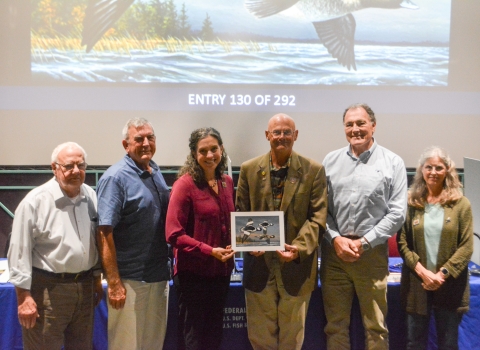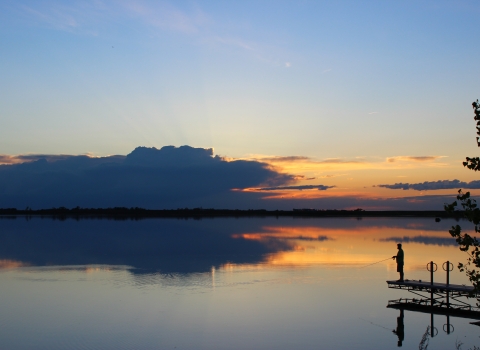Date: 07/05/2022
Contact: Denise Rowell, denise_rowell@fws.gov, 251-656-3490
An Alabama mussel on the brink of extinction now has federal protections, along with critical habitat protections.
After reviewing the best available science, including feedback from peers, scientific experts and the public, the U.S. Fish and Wildlife Service has listed the Canoe Creek clubshell as endangered under the Endangered Species Act. The Service has also designated critical habitat for the mussel, which will help improve water quality for a creek that is used by people and inhabited by more than 90 aquatic species, many of which are also imperiled.
“Big Canoe Creek is already home to ten federally listed aquatic species, and a focal point for aquatic habitat restoration and conservation,” said Leopoldo Miranda-Castro, Service Regional Director. “Endangered Species Act protections for the Canoe Creek clubshell will inspire diverse partnerships that will not only protect a freshwater mussel on the verge of extinction, but a watershed that supports local communities and countless other wildlife.”
The Canoe Creek clubshell, found only in the Big Canoe Creek watershed and nowhere else in the world, needs clean, flowing water to survive. Sedimentation, poor water quality, and events exacerbated by climate change climate change
Climate change includes both global warming driven by human-induced emissions of greenhouse gases and the resulting large-scale shifts in weather patterns. Though there have been previous periods of climatic change, since the mid-20th century humans have had an unprecedented impact on Earth's climate system and caused change on a global scale.
Learn more about climate change , such as more frequent and intense droughts and floods, have combined to devastate Canoe Creek clubshell populations, as well as other freshwater mussels and aquatic species. During a 2017 and 2018 survey, only 25 individuals were found in the entire Big Canoe Creek watershed. Of the individuals found, all were older adults, indicating a stagnant or declining population growth.
While a stretch of unsuitable habitat divides the Canoe Creek clubshell’s range, this final rule will strengthen our collaboration with partners who are already working to conserve the mussel and the Big Canoe Creek watershed, comprehensively. This watershed is considered a priority watershed by the Alabama Rivers and Streams Network, based on the abundance of other imperiled mussels, crustaceans and aquatic species.
Partnerships between government agencies, non-governmental organizations and private landowners have been hard at work to conserve this watershed and the species that call it home. For example, the Partners for Fish and Wildlife Program and Alabama Department of Conservation and Natural Resources have implemented collaborative monitoring efforts for species within the Big Canoe Creek watershed.
The Service has designated 36.3 miles of river across two units as critical habitat for the Canoe Creek clubshell. Unit One, the eastern portion, includes Little Canoe Creek (East), and Unit Two, the western portion, includes Big Canoe Creek/Little Canoe Creek (West). Both units are occupied by the species.
Establishing critical habitat will raise awareness of the needs of the Canoe Creek clubshell and other imperiled species and focus the efforts of our conservation partners. It also alerts federal agencies that they are required to make special conservation efforts when they work, fund, or permit activities in those areas. The designation will have no impact on private landowners taking actions on their land that do not require federal funding or permits.
Highly sensitive to pollution, native mussels are indicators of healthy streams and rivers on which both wildlife and people depend. Mussels also clean water as they feed, filtering sediment and pollutants in the process. North America has the highest diversity of freshwater mussels in the world, with about a third of the world's 900 species found here. Despite our high diversity of mussels, sixty-five percent of them are imperiled. The growing impacts of climate change are anticipated to further exacerbate threats to freshwater mussels, aquatic species and their habitats.
Stemming the ongoing extinction crisis is a central component of the Biden-Harris administration’s bold conservation initiative: America the Beautiful. The initiative is focused on supporting locally led and voluntary efforts to conserve, connect and restore 30 percent of lands and waters in the U.S. by 2030, while enhancing wildlife habitat and improving biodiversity.The complete listing proposal can be obtained by visiting the Federal eRulemaking Portal: regulations.gov at Docket Number FWS–R4–ES–2020–0078. Learn more about this decision by reading the Frequently Asked Questions. Final critical habitat coordinates can be found on our website at: https://www.fws.gov/office/alabama-ecological-services/library
-FWS-
The mission of the U.S. Fish and Wildlife Service is working with others to conserve, protect, and enhance fish, wildlife, plants, and their habitats for the continuing benefit of the American people. For more information on our work and the people who make it happen, visit www.fws.gov/southeast. Connect with us on Facebook at www.facebook.com/usfwssoutheast, follow our tweets at www.twitter.com/usfwssoutheast, watch our YouTube Channel at http://www.youtube.com/usfws, and download photos from our Flickr page at http://www.flickr.com/photos/usfwssoutheast.



